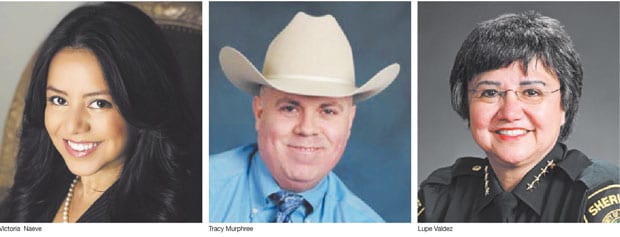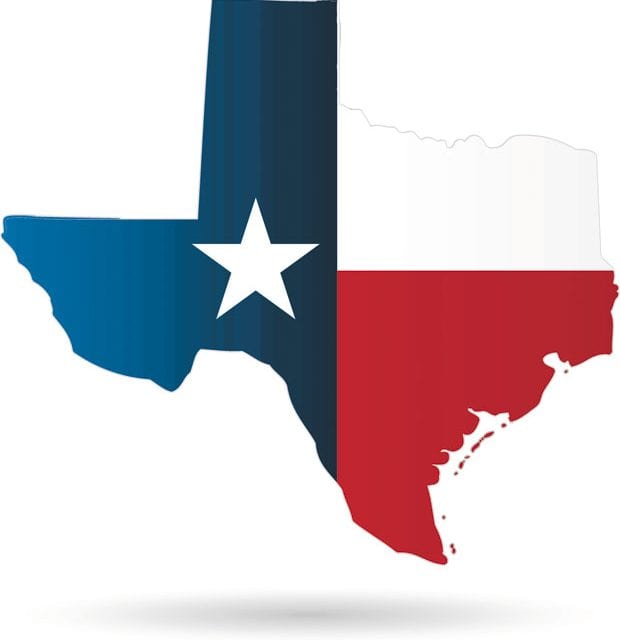Lesbian office holders retained their positions and Democrats made a few gains

DAVID TAFFET | Senior Staff Writer
While Democrats nationally had a much poorer than expected election night, locally there were some bright spots.
• Dallas County voters gave Sheriff Lupe Valdez 57 percent of the vote for her fourth, and possibly final, term in office. Valdez remains the country’s only Latina lesbian sheriff. Currently, only 13 women nationwide serve as sheriffs.
• Both lesbian members of the Texas House of Representatives were re-elected.
Rep. Celia Israel, D-Austin, won her election with more than twice as many votes as her Republican challenger. She first won office in a special election and was elected to her first full term in 2014.
Rep. Mary Gonzalez, D-El Paso, ran for her third term unopposed in the general election after defeating a well-funded challenger in the primary.
• In Dallas, Democrats picked up one seat in the Texas Legislature. Victoria Naeve defeated three-term incumbent Republican Kenneth Sheets for the District 107 seat in the Texas House of Representatives. The district includes neighborhoods around White Rock Lake, Lake Highlands and a corridor along east LBJ Freeway into Mesquite.
For eight years, District 107 was represented by Harryette Ehrhardt, who championed LGBT rights in the legislature. However the district, which included parts of Oak Lawn during Ehrhardt’s time in office, was gerrymandered to move Ehrhardt out, but as Dallas County has become more blue, the seat has flipped back to the Democrats.
• In Dallas County Commissioners Court elections, two LGBT-friendly commissioners were returned to office.
District 1 Commissioner Theresa Daniel easily won a second term with 64.5 percent.
John Wiley Price, whose district includes Oak Lawn and who goes on trial for corruption in February, won 67.4 percent of the vote. Price has been a staunch advocate of HIV care at Parkland Hospital and for equality since first taking office in 1985.

• Dallas County voters elected Darlene Ewing to preside over the 254th Judicial District Court. Ewing was formerly chair of the Dallas County Democratic Party and is credited more than anyone with turning Dallas blue.
• Judge Dennise Garcia did well in her race for Place 7 on the 5th Court of Appeals in Dallas County, where she received 59 percent of the vote, and in Hunt County, where she received 64 percent of the early vote. But she didn’t pull in enough votes to replace incumbent David Schenck in the court that has jurisdiction over six counties.
Garcia continues as judge of the 303rd Family District Court.
• Five Texas counties with major cities voted blue in the presidential race: El Paso, Travis (Austin), Bexar (San Antonio), Dallas and Harris (Houston).
El Paso was the bluest of the urban counties with 69 percent of the vote going to Clinton, followed by Travis with 66 percent. Dallas was third with 61 percent. Harris and Bexar counties delivered 54 percent of their vote to Clinton.
Harris County gave Clinton her largest vote total in Texas — 706,471 — but Trump got his largest vote total in that county as well — 544,960. Dallas was second in total votes for Clinton with 458,845.
One suburban county in Texas turned blue this election — Fort Bend County, southwest of Houston.
Three counties in the Big Bend and 18 counties in the Rio Grande Valley voted for Clinton. The largest was Hidalgo County, which includes McAllen.
Cameron County, which includes Brownsville, Harlingen and South Padre Island, also heavily favored the Democrat.
Several RGV counties went for Clinton with more than 75 percent of votes cast.
Clinton fared poorest in the Panhandle. In King County, she received just 5 votes, or 3.1 percent of ballots cast.
Overall, Trump won Texas with 52.6 percent of the vote. Clinton received 43.4 percent of the vote in Texas — a marked improvement for Democrats in Texas. In 2012, Mitt Romney won the state with 57 percent to Barack Obama’s 41 percent.
• In Denton County, Tracy Murphree received 80 percent of the vote against a Libertarian candidate in their race for sheriff.
During his primary, in which Murphree unseated the incumbent sheriff, the Republican wrote on Facebook, “All I can say is this: If my little girl is in a public women’s restroom and a man, regardless of how he may identify, goes into the bathroom, he will then identify as a John Doe until he wakes up in whatever hospital he may be taken to. Your identity does not trump my little girl’s safety. I identify as an overprotective father that loves his kids and would do anything to protect them.”
That post inspired former Denton City Council candidate Amber Briggle to come out as a parent of a trans child.
Briggle served as a grand marshal in the Tarrant County Pride Parade in Fort Worth last month and continues to staunchly advocate for her transgender 8-year-old.
This article appeared in the Dallas Voice print edition November 4, 2016.

